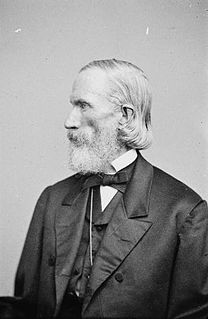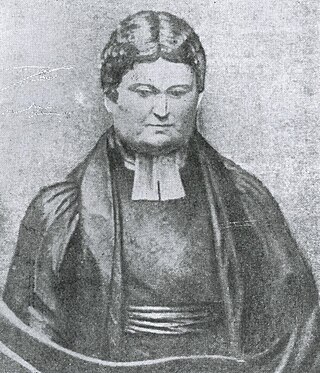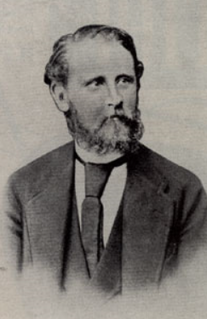
A graham cracker is a sweet flavored cracker made with graham flour that originated in the United States in the mid-19th century, with commercial development from about 1880. It is eaten as a snack food, usually honey- or cinnamon-flavored, and is used as an ingredient in some foods.

Sylvester Graham was an American Presbyterian minister and dietary reformer known for his emphasis on vegetarianism, the temperance movement, and eating whole-grain bread. His preaching inspired the graham flour, graham bread, and graham cracker products. Graham is often referred to as the "Father of Vegetarianism" in the United States of America.
The Nazarenes were an early Jewish Christian sect in first-century Judaism. The first use of the term is found in the Acts of the Apostles of the New Testament, where Paul the Apostle is accused of being a ringleader of the sect of the Nazarenes before the Roman procurator Antonius Felix at Caesarea Maritima by Tertullus. At that time, the term simply designated followers of Jesus of Nazareth, as the Hebrew term נוֹצְרִי, and the Arabic term نَصَارَى, still do.

Ann Lee, commonly known as Mother Ann Lee, was the founding leader of the United Society of Believers in Christ's Second Appearing, or the Shakers.

A lacto-vegetarian diet is a diet that abstains from the consumption of meat as well as eggs, while still consuming dairy products such as milk, cheese, yogurt, butter, ghee, cream, and kefir.

Orson Squire Fowler was an American phrenologist, vegetarian and lecturer. He also popularized the octagon house in the middle of the nineteenth century.

Georg Conrad Beissel was a German-born religious leader who in 1732 founded the Ephrata Community in the Province of Pennsylvania.

John Humphrey Noyes was an American preacher, radical religious philosopher, and utopian socialist. He founded the Putney, Oneida and Wallingford Communities, and is credited with coining the term "complex marriage".

Florence is a village in the northwestern portion of the city of Northampton, Hampshire County, Massachusetts. Having a thriving silk industry in the 19th century, the village was named in 1852 after Florence, Italy, for its own thriving silk trade in Europe.

The practice of vegetarianism is strongly linked with a number of religious traditions worldwide. These include religions that originated in India, such as Hinduism, Jainism, Buddhism, and Sikhism. With close to 85% of India's billion-plus population practicing these religions, India remains the country with the highest number of vegetarians in the world.

Symon Gould was an American politician and vegetarianism activist. He was the co-founder of the American Vegetarian Party, formed in 1948.

The Dönmeh were a group of Sabbatean crypto-Jews in the Ottoman Empire who converted outwardly to Islam, but retained their Jewish faith and Kabbalistic beliefs in secret. The movement was centered mainly in Thessaloniki. The group originated during and soon after the era of Sabbatai Zevi, a 17th-century Sephardic Jewish Rabbi and Kabbalist who claimed to be the Jewish Messiah and eventually feigned conversion to Islam under threat of death penalty by the Sultan Mehmed IV. After Zevi's forced conversion to Islam, a number of Sabbatean Jews also falsely converted to Islam and became the Dönmeh. Part of the Sabbateans lived on until well into 21st-century Turkey as descendants of the Dönmeh.

The earliest records of vegetarianism as a concept and practice amongst a significant number of people are from ancient India, especially among the Hindus and Jains. Later records indicate that small groups within the ancient Greek civilizations in southern Italy and Greece also adopted some dietary habits similar to vegetarianism. In both instances, the diet was closely connected with the idea of nonviolence toward animals, and was promoted by religious groups and philosophers.

William Cowherd was a Christian minister serving a congregation in the City of Salford, England, immediately west of Manchester, and one of the philosophical forerunners of the Vegetarian Society founded in 1847. He was the founder of the Bible Christian Church; Cowherd advocated and encouraged members of his then small group of followers, known as "Cowherdites", to abstain from the eating of meat as a form of temperance.

The relationship between Christianity and animal rights is complex, with different Christian communities coming to different conclusions about the status of animals. The topic is closely related to, but broader than, the practices of Christian vegetarians and the various Christian environmentalist movements.

Gustav Schlickeysen was a German naturopath and raw food advocate.
Herman Daggett was an American Presbyterian minister and early animal rights writer.

Why I Am a Vegetarian is an 1895 pamphlet based on an address delivered by J. Howard Moore before the Chicago Vegetarian Society. It was reprinted several times by the society and other publishers.

Henry Stephen Clubb was a British-American Swedenborgian, abolitionist, chartist, journalist and author, who was state senator for Pennsylvania and founder and first President of the Vegetarian Society of America (VSA).

















